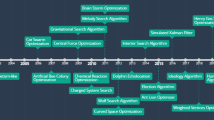Abstract
We propose an evolutionary-based approach to solve engineering design problems without using penalty functions. The aim is to identify and maintain infeasible solutions close to the feasible region located in promising areas. In this way, using the genetic operators, more solutions will be generated inside the feasible region and also near its boundaries. As a result, the feasible region will be sampled well-enough as to reach better feasible solutions. The proposed approach, which is simple to implement, is tested with respect to typical penalty function techniques as well as against state-of-the-art approaches using four mechanical design problems. The results obtained are discussed and some conclusions are provided.
Preview
Unable to display preview. Download preview PDF.
Similar content being viewed by others
References
Michalewicz, Z., Fogel, D.B.: How to Solve It: Modern Heuristics. Springer, Heidelberg (2004)
Miettinen, K., Makela, M., Toivanen, J.: Numerical comparison of some penalty-based constraint handling techniques in genetic algorithms. Journal of Global Optimization 27, 427–446 (2003)
Ray, T., Liew, K.: Society and Civilization: An Optimization Algorithm Based on the Simulation of Social Behavior. IEEE Transactions on Evolutionary Computation 7, 386–396 (2003)
Hernández-Aguirre, A., Botello-Rionda, S., Coello Coello, C.A.: PASSSS: An Implementation of a Novel Diversity Strategy for Handling Constraints. In: Proceedings of the Congress on Evolutionary Computation 2004 (CEC 2004), Piscataway, New Jersey, Portland, Oregon, USA, vol. 1, pp. 403–410. IEEE Service Center (2004)
He, S., Prempain, E., Wu, Q.H.: An Improved Particle Swarm Optimizer for Mechanical Design Optimization Problems. Engineering Optimization 36, 585–605 (2004)
Bäck, T.: Evolutionary Algorithms in Theory and Practice. Oxford University Press, New York (1996)
Schwefel, H.P.: Numerical Optimization of Computer Models. Wiley, England (1981)
Hoffmeister, F., Sprave, J.: Problem-independent handling of constraints by use of metric penalty functions. In: Fogel, L.J., et al. (eds.) Proceedings of the Fifth Annual Conference on Evolutionary Programming (EP 1996), pp. 289–294. The MIT Press, San Diego (1996)
Joines, J., Houck, C.: On the use of non-stationary penalty functions to solve nonlinear constrained optimization problems with GAs. In: Fogel, D. (ed.) Proceedings of the first IEEE Conference on Evolutionary Computation, Orlando, Florida, pp. 579–584. IEEE Press, Los Alamitos (1994)
Hadj-Alouane, A.B., Bean, J.C.: A Genetic Algorithm for the Multiple-Choice Integer Program. Operations Research 45, 92–101 (1997)
Mezura-Montes, E., Coello Coello, C.A.: Adding a Diversity Mechanism to a Simple Evolution Strategy to Solve Constrained Optimization Problems. In: Proceedings of the Congress on Evolutionary Computation 2003 (CEC 2003), Piscataway, New Jersey, Canberra, Australia, vol. 1, pp. 6–13. IEEE Service Center (2003)
Author information
Authors and Affiliations
Editor information
Editors and Affiliations
Rights and permissions
Copyright information
© 2005 Springer-Verlag Berlin Heidelberg
About this paper
Cite this paper
Mezura-Montes, E., Coello, C.A.C. (2005). Useful Infeasible Solutions in Engineering Optimization with Evolutionary Algorithms. In: Gelbukh, A., de Albornoz, Á., Terashima-Marín, H. (eds) MICAI 2005: Advances in Artificial Intelligence. MICAI 2005. Lecture Notes in Computer Science(), vol 3789. Springer, Berlin, Heidelberg. https://doi.org/10.1007/11579427_66
Download citation
DOI: https://doi.org/10.1007/11579427_66
Publisher Name: Springer, Berlin, Heidelberg
Print ISBN: 978-3-540-29896-0
Online ISBN: 978-3-540-31653-4
eBook Packages: Computer ScienceComputer Science (R0)




